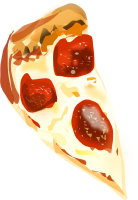Associations to the word «Slice»
Noun
- Onion
- Cucumber
- Bread
- Carrot
- Loaf
- Lemon
- Butter
- Platter
- Sauce
- Vinegar
- Tomato
- Garlic
- Pork
- Salad
- Sausage
- Pineapple
- Cheese
- Toast
- Beef
- Frying
- Pepper
- Pickle
- Quart
- Mutton
- Turnip
- Broth
- Bacon
- Potato
- Pint
- Steak
- Noodle
- Boil
- Raisin
- Sandwich
- Stew
- Mustard
- Fry
- Pizza
- Dish
- Bake
- Beet
- Meat
- Topping
- Mace
- Cake
- Cabbage
- Soy
- Peel
- Chunk
- Pie
- Mushroom
- Wafer
- Salt
- Razor
- Bun
- Pudding
- Vegetable
- Baking
- Ounce
- Juice
- Cinnamon
- Sprout
- Soup
- Chili
- Knife
- Almond
- Ham
- Paste
- Syrup
- Flour
- Pastry
- Banana
- Melon
- Dessert
- Shred
- Ingredient
- Hamburger
- Crust
Pictures for the word «Slice»
Wiktionary
SLICE, noun. That which is thin and broad.
SLICE, noun. A thin, broad piece cut off.
SLICE, noun. Amount
SLICE, noun. A piece of pizza.
SLICE, noun. (British) A snack consisting of pastry with savoury filling.
SLICE, noun. A broad, thin piece of plaster.
SLICE, noun. A knife with a thin, broad blade for taking up or serving fish; also, a spatula for spreading anything, as paint or ink.
SLICE, noun. A salver, platter, or tray.
SLICE, noun. A plate of iron with a handle, forming a kind of chisel, or a spadelike implement, variously proportioned, and used for various purposes, as for stripping the planking from a vessel's side, for cutting blubber from a whale, or for stirring a fire of coals; a slice bar; a peel; a fire shovel.
SLICE, noun. One of the wedges by which the cradle and the ship are lifted clear of the building blocks to prepare for launching.
SLICE, noun. (printing) A removable sliding bottom to a galley.
SLICE, noun. (golf) A shot that (for the right-handed player) curves unintentionally to the right. See fade, hook, draw
SLICE, noun. (Australia) (NZ) A class of heavy cakes or desserts made in a tray and cut out into squarish slices.
SLICE, noun. (medicine) A section of image taken of an internal organ using MRI (magnetic resonance imaging), CT (computed tomography), or various forms of x-ray.
SLICE, noun. (falconry) A hawk's or falcon's dropping which squirts at an angle other than vertical. (See mute.)
SLICE, verb. To cut into slices.
SLICE, verb. To cut with an edge utilizing a drawing motion.
SLICE, verb. (golf) To hit a shot that slices (travels from left to right for a right-handed player).
SLICE, verb. (tennis) To hit the ball with a stroke that causes a spin, resulting in the ball swerving or staying low after a bounce.
SLICE, verb. (badminton) To hit the shuttlecock with the racket at an angle, causing it to move sideways and downwards.
SLICE, verb. (soccer) To kick the ball so that it goes in an unintended direction, at too great an angle or too high.
SLICE, verb. (rowing) To angle the blade so that it goes too deeply into the water when starting to take a stroke.
SLICE, verb. (transitive) To clear (e.g. a fire, or the grate bars of a furnace) by means of a slice bar.
SLICE AND DICE, verb. To cut and chop something to pieces.
SLICE AND DICE, verb. To rearrange or analyze in a number of different ways, often arbitrarily.
SLICE BAR, noun. A tool with a broad flat end that is used to rake out a furnace grate.
SLICE BARS, noun. Plural of slice bar
SLICE CATEGORY, noun. (category theory) Given a category C and an object X ∈ Ob(C), the slice category \( C \downarrow X \) has, as its objects, morphisms from objects of C to X, and as its morphisms, morphisms connecting the tails of its own objects in a commutative way (i.e., closed under composition). The category \( C \downarrow X \) is said to be "over X". (More formally, the objects of C over X are ordered pairs of the form (A, f) where A is an object of C and f is a morphism from A to X. Then the morphisms of C over X have such ordered pairs as their domains/codomains instead of objects of C directly.)
SLICE OF LIFE, noun. A genre which presents day-to-day happenings with no clear central plot and takes place in a world that mirrors our own.
Dictionary definition
SLICE, noun. A share of something; "a slice of the company's revenue".
SLICE, noun. A serving that has been cut from a larger portion; "a piece of pie"; "a slice of bread".
SLICE, noun. A wound made by cutting; "he put a bandage over the cut".
SLICE, noun. A golf shot that curves to the right for a right-handed golfer; "he took lessons to cure his slicing".
SLICE, noun. A thin flat piece cut off of some object.
SLICE, noun. A spatula for spreading paint or ink.
SLICE, verb. Make a clean cut through; "slit her throat".
SLICE, verb. Hit a ball and put a spin on it so that it travels in a different direction.
SLICE, verb. Cut into slices; "Slice the salami, please".
SLICE, verb. Hit a ball so that it causes a backspin.
Wise words
Better than a thousand hollow words, is one word that brings
peace.




_10.png)
_10.png)



